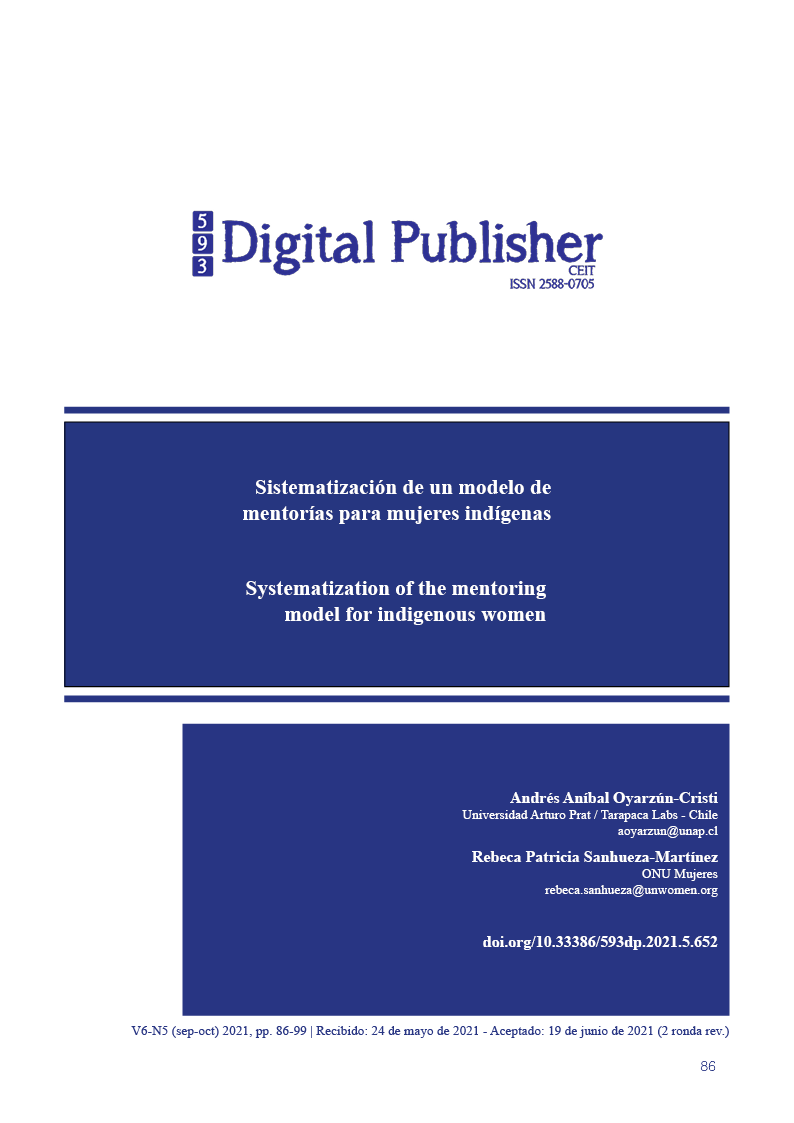Sistematización de un modelo de mentorías para mujeres indígenas
Contenido principal del artículo
Resumen
La formación en emprendimiento requiere de usar la metodología correcta con las personas indicadas. En esa línea, el trabajo formativo con mujeres indígenas demanda respeto, comunicación y cercanía, los cuales se pueden transmitir de mejor forma implementando un proceso de mentoría para compartir experiencias y generar los resultados esperados. El objetivo del presente trabajo es revisar los resultados de un trabajo de mentoring con beneficiarias indígenas realizado en un año calendario en el marco del Programa Originarias de ONU Mujeres, para luego destacar los puntos fuertes, los aprendizajes y sistematizar un modelo base para replicar en próximas generaciones de participantes. Para lograr lo anterior, se revisará la bibliografía y lo que se propone para este tipo de trabajos, y se contrastará con los resultados obtenidos, en cuanto a métricas y experiencias generadas. Durante el 2020 se beneficiaron 36 mujeres con esta iniciativa, de las cuales el 33% logró levantar financiamiento no reembolsable para ejecutar sus planes y negocios. A destacar que los elementos fundamentales radican en la calidad del acompañamiento (de mentoras, mentores y servicios de apoyo), así como en la cercanía generada entre las partes. Finalmente, la propuesta plantea como elemento principal el trabajar con la beneficiaria en el centro del modelo para levantar constantemente necesidades o requerimientos, y complementar en un mismo nivel de importancia la cobertura de formación técnica con la pertinencia cultural, siendo el elemento que genera la propuesta de valor ante las usuarias.
Descargas
Detalles del artículo

Esta obra está bajo una licencia internacional Creative Commons Atribución-NoComercial-CompartirIgual 4.0.
1. Derechos de autor
Las obras que se publican en 593 Digital Publisher CEIT están sujetas a los siguientes términos:
1.1. 593 Digital Publisher CEIT, conserva los derechos patrimoniales (copyright) de las obras publicadas, favorece y permite la reutilización de las mismas bajo la licencia Licencia Creative Commons 4.0 de Reconocimiento-NoComercial-CompartirIgual 4.0, por lo cual se pueden copiar, usar, difundir, transmitir y exponer públicamente, siempre que:
1.1.a. Se cite la autoría y fuente original de su publicación (revista, editorial, URL).
1.1.b. No se usen para fines comerciales u onerosos.
1.1.c. Se mencione la existencia y especificaciones de esta licencia de uso.
Citas
Bell, R., Bell, H., McCracken, M., & Matlay, H. (2016). An enterprise opportunity for entrepreneurial students: Student enterprise development and experience assessed through the student voice. Education+ Training.
Buendía, I., & Carrasco, I. (2013). Mujer, actividad emprendedora y desarrollo rural en América Latina y el Caribe. Cuadernos de desarrollo rural, 10(72), 21-45.
Bustelo, M., Frisancho, V., & Viollaz, M. (2020) ¿Cómo es el mercado laboral para las mujeres en América Latina y el Caribe?. GDLab: Iniciativa de conocimiento sobre género y diversidad. Banco Interamericano del Desarrollo. Disponible en: https://publications.iadb.org/publications/spanish/document/Como-es-el-mercado-laboral-para-las-mujeres-en-America-Latina-y-el-Caribe.pdf
Castelnuovo, N. (2013). Mujeres indígenas y desarrollo: las experiencias de tres mujeres guaraníes del noroeste argentino. Cuicuilco, 20(57), 11-46.
Castillo, A. M., Ordóñez, D. Y., Erazo, L., & Cabrera, J. (2020). Emprendimiento Rural, una Aproximación desde el Empoderamiento Femenino. Empresarial, 14(1), 38-51.
Castillo López, A. M., Ordoñez Abril, D. Y., Giraldo Velez, L. C., & Gallego Muñoz, D. L. (2020) Participación de la mujer indígena en el emprendimiento rural como agente de cambio. Una revisión de literatura. Revista ESPACIOS. ISSN, 798, 1015.
Coraggio, J. L. (2011) Economía Social - El trabajo antes que el capital. Quito, Ecuador: ABYA-YALA.
Coral Guerrero, C. A. (2018). Emprendimiento indígena,¿ Una dimensión económica del Sumak Kawsay?. REVESCO. Revista de Estudios Cooperativos, (129), 123-141.
Deere, C., & León, M. (2000). Género, propiedad y empoderamiento: Tierra, Estado y mercado en América Latina. Bogotá: Tercer mundo S.A.
Erazo, M., Jiménez, M., & López, C. (2014). Empoderamiento y Liderazgo Femenino; su papel en la autogestión comunitaria en el corregimiento El Hormiguero-Valle Del Cauca. Avances en Psicología Latinoamericana, 32(1), 149-157.
Guerrero, G. M., Fernández, D. M., & Ramos, P. A. (2018). Empoderamiento y demanda de autogestión. Estudio comparativo de emprendimientos de mujeres indígenas. Revista Sophia Austral, (21), 43-59.
Higgins, M. C. y Kram, K. E. (2001). Reconceptualizing mentoring at work: A developmental network perspective. Academy of Management Review, 26 (2), 264-288.
Kram, K. E. (1985). Mentoring at work: Development relationships in organizational life. Glen-view IL: Scott, Foresman.
Macas, L. (2010) El Sumak Kawsay. Yachaykuna, No 13, pp. 1339.
Mazón y Fabelo (2007). Una propuesta para la asimilación de conceptos matemáticos a través del aprendizaje significativo.
Mayoral, L. (2012). Red de mentoría emprendedora en el sector de las Tecnologías de la Información y la Comunicación: La diversidad de los roles sociales y la fuerza de los lazos débiles como soportes de la innovación tecnológica en Tandil, Argentina. Cuadernos de Administración, 25(45).
Montero, M. (2004). Introducción a la Psicología Comunitaria. Desarrollo, conceptos y procesos. Buenos Aires: Editorial Paidós.
Nabi, G., Walmsley, A. y Akhtar, I., Mentoring Functions and Entrepreneur Development in the Early Years of University, doi:10.1080/03075079.2019.1665009, Studies in Higher Education, 1-16 (2019).
ONU Mujeres (2021). Glosario de igualdad de género. Visitado el 23 de mayo de 2021, en el link: https://trainingcentre.unwomen.org/mod/glossary/view.php?id=150&mode=letter&hook=E&sortkey=&sortorder=asc
Oyarzún, A., Maturana, C., & Ayala, E. (2020). Impacto de la formación emprendedora en estudiantes de etapas tempranas. 593 Digital Publisher CEIT, 5(6), 117-130. https://doi.org/10.33386/593dp.2020.6.374
Pallarès, M., & Vera, A. (2018). Emprendimiento e innovación de las mujeres: hacia una mayor sostenibilidad en las áreas rurales de montaña. Cuadernos geográficos de la Universidad de Granada, 57(3), 36-57.
Pérez, G. (1994). II Técnica de Recolección de datos. Investigación Cualitativa. Retos e Interrogante. Madrid: La Muralla S.A.
Portuguez-Castro, M., & Gómez-Zermeño, M. G. (2020). Mentoría en curso de emprendimiento en línea. Sistematización de una experiencia en educación superior. Formación universitaria, 13(6), 267-282.
Quintana, P. J. V., Santos, F. D., Quintas, S., & Fernández, A. B. (2010). La mentoría entre iguales y el desarrollo de competencias. Mentoring & Coaching,(3), 7185.
Riaño, R., & Okali, C. (2008). Empoderamiento de las mujeres a través de su participación en proyectos productivos: experiencias no exitosas. Convergencia, 15(46), 119–141.
Rowlands, J. (1997). Empoderamiento y mujeres rurales en Honduras: un modelo para el desarrollo. En M. León (Comp.), Poder y empoderamiento de las mujeres (pp. 213-245). Bogotá: Facultad de Ciencias Humanas, TM Editores, Tercer Mundo.
Sánchez García, M., Manzano Soto, N., Rísquez, A., & Suárez Ortega, M. (2011). Evaluación de un modelo de orientación tutorial y mentoría en la Educación Superior a distancia.
Sharafizad, J., Informal Learning of Women Small Business Owners, doi. 10.1108/et-01-2017-0006, Educ.+Training, 60(1), 82-103 (2017).
SEPS (2017) Superintendencia de Economía Popular y Solidaria - SEPS - SEPS. Retrieved September 28, 2017, from http://www.seps.gob.ec/.
Single, P. B. & Muller, C. B. (1999). Electronic Mentoring: Issues to Advance Research and Practice. Annual Meeting of the International Mentoring Association,Atlanta, 15-17 de abril (en papel).
Ting, S.X., Feng L., y Qin W. The Effect of Entrepreneur Mentoring and its Determinants in the Chinese Context, doi: 10.1108/md-07-2016-0477, Manag. Decision, 55(7), 1410-1425 (2017).



